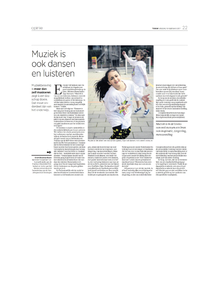This relationship between external knowledge providers, e.g. consultants and academic institutions, and small and medium enterprises (SMEs) is a difficult one. SME entrepreneurs think external advice is expensive, not required and/or not useful. In this paper these arguments are explored against the specific characteristics of SMEs. The argument of price probably tells more about the consultants inability to quantify the returns on their advice than about the cost of their services. Support policies enable free consults for SMEs on numerous topics, but the use of these facilities is relatively low. The suggestion that SME entrepreneurs do not need external knowledge is contradicted by their own assessment of their qualities. Typically the entrepreneurs lack expertise in supporting business functions like HR, IT, Finance and Legal. In SMEs these blank spots are not compensated by specialist staff members because the of the scale of the organization. The argument that the advice of an external consultant is generally not useful raises the question whether the insights gained in several business sciences only apply to large companies. This seems unlikely. Given the characteristics of SMEs the difference is probably more the context in which the insights are applied than the content of the insights itself. From the analysis of the characteristics of SMEs the dominant influence of the person of the owner/director, together with the absence of specialist staff, appeared as two of the most significant differences between SMEs and large companies. Given the personal profiles of these owners/directors as studied by Blom (Blom, 2001), the external knowledge providers should realize the three ways in consulting. The first way is the way of thinking. For this way it was stated already that the content of business sciences is not likely to differ for SMEs. The second way, the way of working, represents for the way information is gathered and the entrepreneur and his staff is involved in the process of developing the advice. In this way the consultant should allow for interaction and should make it fun for the participants. In this aspect, the process approach of consulting shows promising. The third way, the way of communicating, represents the way the knowledge is transferred from the advisor to the entrepreneur. In this way it is crucial to acknowledge the different personal profiles of SME entrepreneurs and consultants and to adjust the communication accordingly. Taking the three ways into account, the conclusion could be that the transfer of knowledge should be more the sharing of experiences. The Chair of Management Consulting will adjust her activities to explore this insight further.
DOCUMENT

Verhalen van jongeren die niet passen in bestaande scripts van vallen, opstaan en succes worden niet serieus genomen. We luisteren niet eens naar hen. In de ‘Bibliotheek van tussenverhalen’ gebeurt dat wel, vertellen onderzoekers Sebastian Abdallah, Elena Ponzoni en Jacomijne Prins.
MULTIFILE
Veel basisscholen vinden het knap lastig om vorm te geven aan de samenwerking met ouders. Dat is ook niet verwonderlijk. Er is niet één recept waarmee dat het beste kan. De samenwerking is zeer afhankelijk van de context. Zo vraagt het op een kleine dorpsschool om een andere werkwijze dan op een grote multiculturele stadsschool. Om goed te kunnen samenwerken moeten leerkrachten en ouders op de hoogte zijn van elkaars wensen en verwachtingen. Daarom staat in deze klapper een stappenplan voor het “Luisteren, Denken & Doen” met betrekking tot de samenwerking tussen ouders en school.
DOCUMENT

De opkomst bij de gemeenteraadsverkiezingen van maart 2022 in Nederland was historisch laag. In Den Haag lag de opkomst op 43 procent. Het opkomstpercentage verschilde sterk tussen wijken. Voor dit onderzoek zoomen we in op vijf wijken: Bouwlust en Vrederust; Laakkwartier en Spoorwijk (beide met een opkomst onder de 30 procent); Mariahoeve en Marlot; Staten- en Geuzenkwartier (opkomst rond het stedelijk gemiddelde) en de Vogelwijk (met 77 procent een relatief hoge opkomst). Doel en vraagstelling Het doel van het onderzoek is inzicht bieden in de beweegredenen van stemmers en niet-stemmers in verschillende wijken en het bieden van handelingsperspectieven voor de gemeenteraad, het college en de gemeentelijke organisatie. De drie hoofdvragen van het onderzoek zijn: - Wat zijn de motieven van stemmers en niet-stemmers? - Hoe kunnen we verschillen verklaren tussen wijken en groepen bewoners? - Welke handelingsperspectieven kunnen worden ontwikkeld, zowel voor het bevorderen van de opkomst als het vergroten van de betrokkenheid van bewoners bij de gemeentepolitiek?
DOCUMENT

Met dashboards en fitbits krijgen we continu updates over de 'stand van zaken'. Deze weergaves voldoen dan aan de vraag vaak naar eenvoud en transparantie. Het verzoek aan dit soort instrumenten is om niet lastig te zijn over nauwkeurigheid, betrouwbaarheid en waarschijnlijkheid, maar om complexe begrippen te reduceren tot een score op één meetpunt. Maar hoe vertalen we deze meetscores? Een cijfer heeft op zichzelf een waarde, maar geen betekenis.
LINK
Ooit was natuurbeheer de exclusieve verantwoordelijkheid van ecologen en boswachters. Afgelopen decennia kregen zij gezelschap van communicatieprofessionals. Zij hielpen de natuurorganisaties op weg met de vermaatschappelijking van de natuur. En niet zonder gevolgen, want steeds vaker eisen burgers en belanghebbenden nu hun positie op.
DOCUMENT

Opiniestuk in Trouw over de nieuwe subsidieregeling voor het verbeteren van het muziekonderwijs op de PABO en de noodzaak dit niet te beperken tot het bespelen van een instrument.
DOCUMENT

1e alinea column: "Een mens heeft twee oren en één mond om twee keer zoveel te luisteren dan te praten,"- Confucius. Internet dwingt organisaties tot echt luisteren, omdat samenwerken anders te duur wordt. In de 'digital age' gaat het daarom over het bouwen van ecosystemen, 'to share is to gain', en over snel herkennen van nieuwe routes, nieuwe mensen om mee samen te werken, nieuwe combinaties en nieuwe kansen die komen en gaan. "Life is happening to you while you are busy making other plans," zei John Lennon.
LINK